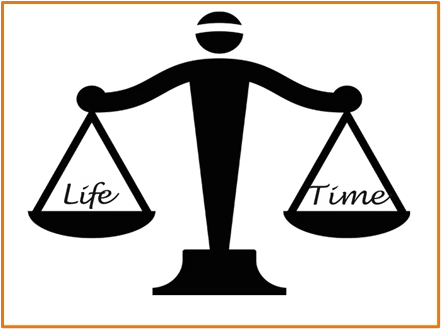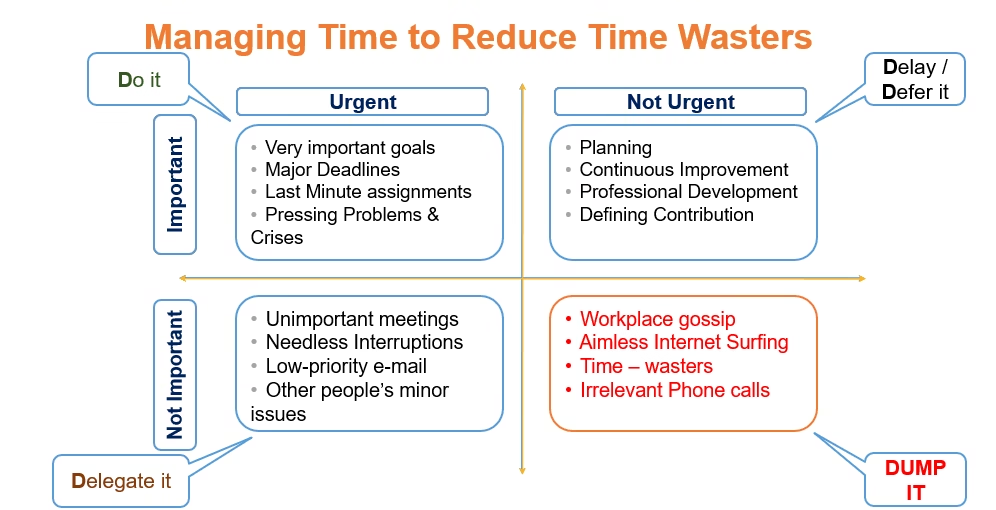Time management helps one utilize their time to accomplish tasks that can add value to their knowledge, wisdom, health or work.
•This also includes the time when you are mentally free e.g., bathing, cooking, etc. Time management helps you to become a productive Person.

•This can be done by practices, skills, tools and systems
Importance & Impact of Time Management.

•Time is a precious resource and if not managed well, we will fall short of it.
•It will help one strike balance between personal and professional life.
•Time management helps you make most out of available time.
Basis of Time Management
- Know what you want to do
- List what you have to do.
- Choose what order to do it in and what not to do.

Time Management Includes

Time is a Gift!
Watch this for a better understanding of Time Management- https://youtu.be/XWHqUbdXgF8


Why do we should have Time management Skills?
Time management skills are essential because they empower you to make the most of your day and achieve your goals effectively. Here’s why they matter:
- Increased Productivity: With good time management, you can focus on tasks that truly matter, making your efforts more productive and impactful.
- Reduced Stress: Knowing what to do and when to do it prevents last-minute rushes, reducing anxiety and creating a sense of control.
- Improved Decision-Making: Organizing your time helps you prioritize tasks, ensuring you focus on what’s important rather than just what’s urgent.
- Work-Life Balance: By allocating time wisely, you can ensure a healthy balance between personal and professional life.
- Boosted Confidence: Accomplishing your tasks on time gives you a sense of achievement and boosts your confidence.
- Long-Term Success: Proper time management helps you align your daily actions with your long-term goals, paving the way for sustained success.
Time management examples with daily life
- Morning Routine: Setting an alarm, preparing for the day, and planning priorities for work or school before leaving the house.
- Work/Study Schedule: Allocating specific blocks of time for important tasks, meetings, or study sessions, and tackling the toughest tasks (your “frogs”) first.
- Meal Planning: Prepping meals in advance to save time during busy weekdays, ensuring you eat healthily without the last-minute rush.
- Exercise Routine: Scheduling a workout session during a specific time, like early morning or evening, to make it a consistent habit.
- Errands: Grouping similar tasks, such as grocery shopping and visiting the bank, in one trip to save time and energy.
- Relaxation Time: Blocking out moments to unwind, whether it’s reading, meditating, or spending quality time with loved ones.
- Managing Distractions: Setting limits on social media or phone use during work or study hours to stay focused.
- Evening Prep: Organizing your workspace, packing your bag, and making a to-do list for the next day before going to bed.
- Family Time: Planning activities or meals together to strengthen relationships without conflicts in schedules.
Time management examples with daily life in a job.
- Prioritize Tasks (The “Frog Method”): Start your day by identifying and completing the most critical and challenging tasks first. This ensures you tackle high-priority work while your energy is at its peak.
- Set Time Limits for Meetings: Allocate a specific amount of time for meetings and stick to the agenda to ensure efficient use of everyone’s time.
- Batch Similar Tasks: Group related tasks together, such as responding to emails, making calls, or reviewing documents, and handle them during specific time blocks.
- Use Technology Tools: Utilize apps like Microsoft Teams, Outlook, or task management tools like Trello or Asana to organize tasks and set reminders.
- Plan Your Day in Advance: Before leaving work or starting your day, create a to-do list or schedule. This ensures you begin the day with clear priorities.
- Delegate When Possible: If certain tasks can be handled by team members, delegate them so you can focus on higher-value work.
- Take Breaks Strategically: Use the Pomodoro Technique, working for 25-minute focused intervals followed by 5-minute breaks, to maintain energy and avoid burnout.
- Minimize Distractions: Keep your phone on silent, turn off unnecessary notifications, and create a dedicated workspace to stay focused.
- Reflect and Review: At the end of the day, evaluate what you’ve accomplished and adjust your plans for the following day.
- Set Boundaries: Clearly define working hours and avoid overcommitting, ensuring you’re not overwhelmed with tasks.
I want to share one application from which you can do your time management very well. It will help you in your accountability and your time management. It will help you to contribute in time management, You can note down anything which you want to record in this notes.
Application Name – Best Note Taking App – Organize Your Notes with Evernote
If you will document anything then it will manage your time and also improve your productivity because you will take action on that notes. So start writing my friends.
Also Read:- https://callmepandeyji.com/how-to-switch-from-non-it-to-it-in-2025/
